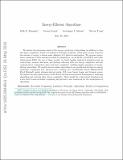Energy-Efficient Algorithms
Author(s)
Demaine, Erik D; Lynch, Jayson R.; Mirano, Geronimo J.; Tyagi, Nirvan
DownloadEnergy-efficient algorithms.pdf (425.3Kb)
OPEN_ACCESS_POLICY
Open Access Policy
Creative Commons Attribution-Noncommercial-Share Alike
Terms of use
Metadata
Show full item recordAbstract
We initiate the systematic study of the energy complexity of algorithms (in addition to time and space complexity) based on Landauer's Principle in physics, which gives a lower bound on the amount of energy a system must dissipate if it destroys information. We propose energy-aware variations of three standard models of computation: circuit RAM, word RAM, and transdichotomous RAM. On top of these models, we build familiar high-level primitives such as control logic, memory allocation, and garbage collection with zero energy complexity and only constant-factor overheads in space and time complexity, enabling simple expression of energy-efficient algorithms. We analyze several classic algorithms in our models and develop low-energy variations: comparison sort, insertion sort, counting sort, breadth-first search, Bellman-Ford, Floyd-Warshall, matrix all-pairs shortest paths, AVL trees, binary heaps, and dynamic arrays. We explore the time/space/energy trade-off and develop several general techniques for analyzing algorithms and reducing their energy complexity. These results lay a theoretical foundation for a new field of semi-reversible computing and provide a new framework for the investigation of algorithms.
Date issued
2016-01Department
Massachusetts Institute of Technology. Computer Science and Artificial Intelligence LaboratoryJournal
Proceedings of the 2016 ACM Conference on Innovations in Theoretical Computer Science (ITCS '16)
Publisher
Association for Computing Machinery (ACM)
Citation
Demaine, Erik D., Jayson Lynch, Geronimo J. Mirano, and Nirvan Tyagi. “Energy-Efficient Algorithms.” Proceedings of the 2016 ACM Conference on Innovations in Theoretical Computer Science - ITCS ’16 (2016), Cambridge, Massachusetts, USA, January 14-17, 2016, pp. 321-332.
Version: Author's final manuscript
ISBN
9781450340571